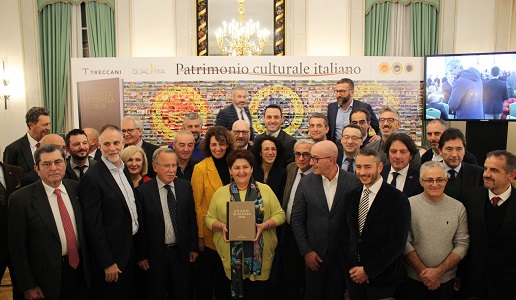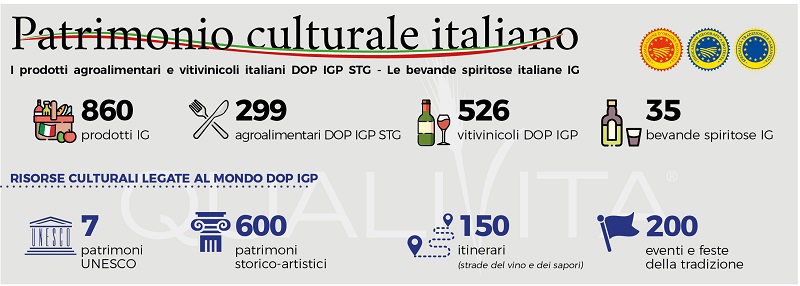Published by Treccani the Qualitavita Atlas on Dop and Igp

Treccani welcomes PDOs and PGIs in the Italian cultural heritage by publishing the Atlante Qualivita. The minister Bellanova: "Maximum commitment to PDOs and PGIs, a symbol of the success of Made in Italy".
Presented in Rome the Atlante Qualivita - I prodotti agroalimentari e vitivinicoli italiani DOP IGP STG - Le bevande spiritose italiane IG, with speeches by the Minister for Agricultural Policies Teresa Bellanova and the S&D ComAgri Coordinator of the European Parliament Paolo De Castro and reports by Cesare Mazzetti President of the Fondazione Qualivita, Riccardo Ricci Curbastro President of Federdoc, Cesare Baldrighi President of OriGIn Italia, Massimo Bray Director General of the Istituto della Enciclopedia Italiana and Mauro Rosati Director of the Fondazione Qualivita.
For the first time Treccani welcomes the culture of Geographical Indications and typical Italian products within the corpus of its works with the publication of the tenth edition of the Atlante Qualivita, the first and only volume in Europe dedicated to certified productions. An "encyclopaedic" reference produced by Fondazione Qualivita, in collaboration with OriGIn Italia and Federdoc, to affirm the role of quality Italian supply chains as an element of national culture, alongside an invaluable economic value for the country.
The Qualita Atlas is a profound synthesis of a varied wealth thanks to 860 product sheets, divided into three sections: food products (299 sheets), wine products (526 sheets) and spirits (35 sheets made in collaboration with Assodistil), which describe in detail each of the Italian excellence protected as a Geographical Indication, through information on processing method, history, regulations, nutritional and organoleptic characteristics of the products themselves. A renewed tool of knowledge for Italians, who have always been prepared to be conscious consumers and attentive to the concepts of authenticity and origin.
A cultural value, that of PDO and IGGP products, is also testified by the close connections with some UNESCO awards in Italy. Among these, the intangible cultural heritage such as "The Mediterranean diet" (2013), "The art of the Neapolitan pizzaiuolo" (2014), "The cultivation of the vine tree of Pantelleria" (2014), "The art of dry stone walls" (2018) and the world cultural and natural heritage sites such as "Val d'Orcia" (2004), "Wine landscapes of Langhe-Roero and Monferrato" (2014) and "Prosecco hills of Conegliano and Valdobbiadene" (2019).
An invaluable heritage, that of the Italian Geographical Indications, which also emerges from the surveys carried out by Ismea and Qualivita that have mapped more than 600 Cultural Resources - Architectural and artistic heritage up to literary works - more than 200 events and 150 itineraries all intimately linked to PDO and PGI productions.

Statements:
Teresa Bellanova - Minister for Agricultural, Food and Forestry Policy
The 2020 edition of the Qualivita Atlas represents a moment of great importance for the universe of denomination productions. Over the years we have in fact witnessed with satisfaction the significant growth of a sector that we can define to all intents and purposes the flagship of the Italian agri-food heritage. And today, with the strengthening of the precious collaboration started with the Treccani Institute, we register another strategic recognition, which clearly shows us how much the value of the denominations is to be sought first of all in the cultural character that they express. Link with the territory, tradition and innovation, memory, know-how handed down over time and defended by our entrepreneurs. These are the elements at the base of the success of Made in Italy in the world, which we must continue to protect and promote with increasing conviction and determination.
Paolo De Castro - S&D Coordinator ComAgri EU Parliament and Pres. Scientific Committee Qualivita
PDO and PGI culture and food products are a formidable combination, which makes it possible to enhance the territories by combining the many stories of the Italian province. And the Atlante Qualivita, in addition to confirming itself as a point of reference and a precious working tool for operators with its over 800 products, including food and wine, in this 2020 edition, which sees Treccani as a publisher, becomes a "single text" of the quality agri-food system. A publication with high added value that describes with academic and scientific expertise two of the most valuable axes of the made in Italy - Designations of Origin and Protected Geographical Indications recognized by the European Union - and spearheads of our exports in the world.
Massimo Bray - General Manager of Treccani
It is a very satisfying occasion for me to welcome the new edition of the Atlante Qualivita to the catalogue of Treccani's works, which is enriched by the editorial and cultural contribution of the Istituto della Enciclopedia Italiana. The Atlante Qualivita 2020, published by Treccani, represents a key tool for the knowledge of typical Italian productions and their distinctive elements. Treccani has chosen to work alongside the Qualivita Foundation because, today more than ever, it feels the need to promote the image of productive Italy in the world in an authoritative way, placing the food and wine varieties of our country alongside the other constituent elements of the national cultural heritage. We are convinced that it is possible to produce wealth respecting and enhancing our territory, our landscape, our tradition. And that cultural diplomacy and friendship between peoples can also pass through the recognition and promotion of the culture of food and wine, whose infinite specificities constitute the articulated and fascinating map of connections, ancient and more vital than ever, between man and the territory in which he lives.
Cesare Mazzetti - President of the Qualivita Foundation
The 2020 edition of the Atlante Qualivita was born with an exceptional publishing partner, the Institute of the Italian Encyclopedia Treccani. After the creation of Treccani Gusto, the first online dictionary of PDO and PGI products, Fondazione Qualivita and Treccani have further strengthened the existing link, creating the Atlas 2020 in this splendid new guise. But it is certainly not only the habit that makes the monk: the double signature of the book wants to testify to the world what our Foundation has always preached, namely the very close link between the Italian agri-food products with Geographical Indication and the culture of the territories from which they originate.
Riccardo Ricci Curbastro - President of Federdoc
The work carried out by Qualivita and Treccani, aimed at enclosing in a single volume the great variety of Italian viticultural heritage and the excellence that characterize it, is highly appreciated by Federdoc and its associated Consortia of protection. Among our institutional aims and those of the Consortia there is the diffusion and knowledge of the uniqueness of the Denominations of Origin, the narration of their territory, their history and the wine-growing traditions that are hidden behind a bottle, bringing to the attention of the public also the commitment of the producers in giving the DOs a superior, innovative and sustainable quality that distinguishes these productions from the others. This is why we support the project of the Fondazione Qualivita and the Istituto dell'Enciclopedia Italiana Treccani, through which it presents to the public, enclosed in an authoritative container, part of our winemaking knowledge.
Cesare Baldrighi - President Originally from Italy
The Qualita Atlas collects and enhances the cultural heritage of all Italian products with Geographical Indication, and represents a reference point for the knowledge of typical productions of excellence, as well as an excellent way to keep high the attention on the positioning of PDOs and PGIs as a cultural value of our country. The fact that this year for the first time it will be published by the Institute of the Italian Encyclopedia Treccani only confirms its prestige and authority; it will be more than ever an opportunity to launch the typical Italian food and wine in the international context.
Source: Qualivita Foundation - Communication Area

 Italiano
Italiano







